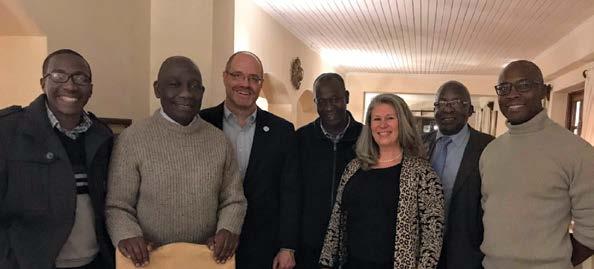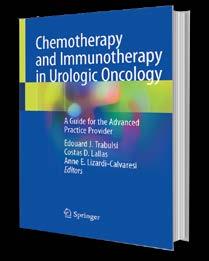
8 minute read
Alumni Spotlight
Jefferson Alum Builds Hope in Home Country
By Cindy Lefler
Urological Surgeon Brings Healthcare and Education to Zimbabwe.
Allen Chiura, MD, returned home to Zimbabwe for the same reason he left: hope.
Growing up in an apartheid system, Chiura has vivid memories of his young world being separated into black and white—and then suddenly blended. “I remember being in primary school and not being able to play (sports) matches across the street at the government school because I was black,” he says. “And then I was 16 years old when independence came in 1980 and all of that changed; all of a sudden blacks and whites were just together, and we were growing this new country, and there was a little reconciliation and real great hope that existed.”
He left Zimbabwe to attend college, medical school, and residency programs in the United States, staying for another 30 years to practice urological surgery in Delaware, Ohio and Oregon. But in 2011, he knew it was time to come home; it was time to bring more hope to a country that is still struggling to find the reconciliation and equality that independence never delivered.
Chiura was born in Zimbabwe to a businessman-turned-educator father and health professional mother. His father Enos Chiura was the first chairman of BCCZ, the first pioneer bank after independence, and the first black CEO of the largest corporation in Zimbabwe. His mother, Faith Chiura, was a prominent nurse and midwife.
Chiura attended American University in Washington, D.C., followed by the Medical College of Pennsylvania (MCP). As a youth, he was an athlete who played “every sport known to man.” When he suffered a serious knee injury at 16, the orthopaedic surgeon who repaired the damage made a great impression on him so he decided to set his sights a career as an orthopedic surgeon. “The doctor was from Zimbabwe, but trained in the United States and came back,” he says. “He was an amazing surgeon and a really charismatic character. That was my first inkling that I wanted to do surgery.”
Chiura planned to return to Zimbabwe as an orthopaedic surgeon, and to become the official doctor of the Zimbabwe Olympic team. There was only one problem—when he got to his third year of medical school and did a clinical rotation in orthopaedics, “I absolutely detested it.” Fortunately, there was another influence in his life that led him to urology. “My medical school advisor at MCP was a wonderful man. He always seemed happy, so I asked someone, ‘what does he do?’ They told me he was a urologist, and I didn’t know what urology was, but I didn’t care. I said whatever that man does, I want to do because he seems to have gotten it right.” After graduating from MCP, Chiura applied for a urology residency at the historically black Howard University Hospital in Washington, D.C. “Ever since I’d gone to school, I’d always been a minority,” he explains. “In primary school and secondary school… in the U.K (where his family lived briefly when he was young)… even in college and grad school in D.C., I was always a minority. And I thought to myself: I wonder what it would be like to be in a majority situation.”
He first had to complete a two-year residency in general surgery at Pennsylvania Hospital, and by the time he moved on to Howard, he found that the situation had changed. “I was there for a year and the program was shut down,” he says. A mutual friend and colleague suggested he transfer to Jefferson. “And the rest is history.” Chiura, who completed his Jefferson residency in urology in 1998, says what he learned from his time at Jefferson went beyond a good medical education. “I am really passionate about taking care of people and delivering good healthcare, and that’s what I learned from Jefferson,” he says. “Just being a good doctor really means a lot to me. And I can honestly attribute that to the people that trained me at Jefferson.”
Chiura attributes his immense appreciation for “quality health and patient care” to his attending and peers at Jefferson. Specific faculty who impacted his urology training included Drs. Leonard Gomella, Demetrius Bagley, Grant Mulholland, “Sonny” Figueroa, Kenneth Brownstein, Irvin Hirsch, and David Rivas.
After spending three decades in the United States building up his practice and his reputation, Chiura had an “aha” moment about returning to Zimbabwe. Actually, he says, it was his wife’s “aha” moment. His wife, J. Nozipo Maraire, MD, is a renowned neurosurgeon and the author of “Zenzele: A Letter for My Daughter,” a New York Times “Notable Book of the Year” and a Boston Globe best-seller.
It was one frigid Oregon winter day that Maraire, also a native of Zimbabwe, gave Chiura an ultimatum.“It was the dead of winter. She goes out one morning to get into the car to go to work and she can’t open the door because it’s frozen. She comes back into the house to get some hot water to throw on the locks and says, ‘All right, that’s it. I’m done. By next winter, you better have me out of here.’”
The couple had always been active in helping their home country, collecting medical supplies and raising money to purchase provisions to send home to Zimbabwe.“We finally said, ‘Look, we obviously can have a much bigger impact, and the only way we’re going to be able to do that is go home and be there and do it,’” he says.
They visited home in 2011 and had to make an immediate choice based on the availability of placement in a private school for their children. They decided on the spur of the moment: it was a “go.” They were in Zimbabwe a few months later. He admits the move home was not very well planned, and the first year-and-a-half was difficult. “But in hindsight it was the right
Dr. Allen Chiura, 1998 Jefferson Urology Residency graduate
thing to do.” He brought with him a wealth of medical knowledge and experience, and a desire to make his portion of the world better. His wife was an enthusiastic partner in this endeavor.
Chiura and Maraire knew each other as teenagers—and shared a mutual dislike of each other. When she left to finish high school in Wales, Chiura says it didn’t bother him at all. “Fifteen years later I’m standing at Terminal Four at Heathrow Airport. I turn around and she’s standing in front of me,” he recalls. She was on her way back from Ethiopia to Connecticut to finish her residency; he was on his way back from Zimbabwe to Philadelphia to finish his residency. “She says: ‘Are you Allen?’ I immediately recognized her.”
They spent the rest of the time before their flights catching up. “We had a lot in common… and she had changed. So I married her,” he laughs, adding, “Um… that’s my story.” Allen and Nozipo’s wedding was featured in 1999 in Martha Stewart’s Wedding magazine. Together, their story includes providing clinical care to the people of Zimbabwe, medical training to young physicians, and an educational outlet for children.
“We’ve been privileged to train in the United States and we wanted to be able to provide that same level of care to the patients that were here,” he says. In addition, Chiura and Maraire are involved in the training of residents in urology and neurosurgery at the University of Zimbabwe’s College of Medicine and Health Sciences and Parirenyatwa Government Hospital in Harare, Zimbabwe. He calls his involvement with the training program gratifying, as “these young people are so enthusiastic and eager to learn.”
Chiura and Maraire have been working to build a small hospital they hope to open the first quarter of 2021. Because securing a loan in the country is difficult, the couple has been selffunding the initiative brick by brick for more than eight years. “The idea behind the hospital is that we will have another location to be able to continue training young surgeons,” he explains. In addition, a more ambitious “hope” is to establish a private medical school.
“All the medical schools in Zimbabwe are government medical schools. We are of the belief that we need to have a private medical school just to have a different way of doing things—a more innovative way.” The goal is to eventually harness all the connections and relationships the couple has built in the United States to establish educational ties between the two countries.
“I would like to have SKMC students or Jefferson urology residents be able to come and spend some time here. I think it would expose them to a completely different healthcare system, and the interactions that they would have with our training would be beneficial for them.”
While the hospital and medical school are works in progress, the couple has succeeded in creating the country’s first— and only—interactive children’s museum, the Discovereum. Chiura explains that they became enamored of children’s museums while taking their family on vacation throughout the world, making a point to visit a one wherever they traveled. The couple has four children, daughters now 20 and 18, and sons now 16 and 13, the youngest adopted from Zimbabwe. Because they came to appreciate the educational value of children’s museums, they decided to create one in Zimbabwe.
“My wife is very creative, and so we started designing and building exhibits, and next thing you knew, we had a big old warehouse that we converted it into a children’s museum,” he says, noting it is an investment in future generations. Today, Chiura is continuing to invest in his country, and to build on the hope he saw as a teenager. Unfortunately, he says, due to ongoing political and social turmoil, complete reconciliation and equality has never been realized in his country.
“But I still have great hope in this country, and that is purely because of the people,” he says. “Zimbabweans are amazing people— wonderful, warm, caring, giving people. They get trampled upon, but they get up and they just keep going. And so the hope is not the same kind of hope that I had back then (at 16). It’s a different kind of hope. And I just want to be here and be a part of it.”









